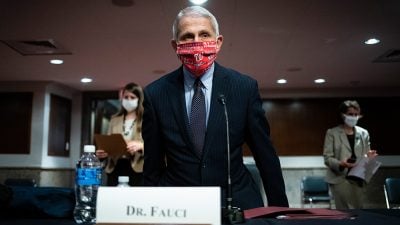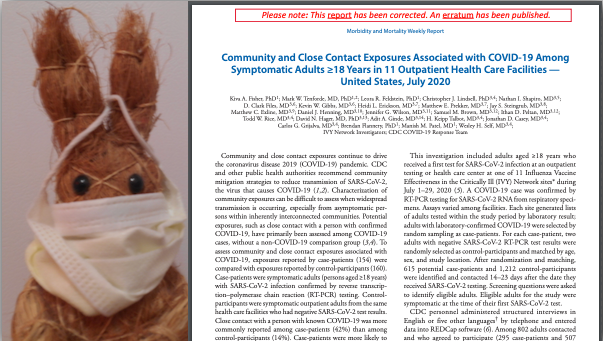Does this CDC Report Actually Show that Mask Wearers Are 17x More Likely to Get COVID-19?

I’m afraid I’m going to be the fact-checking party, again. I must call foul on those claiming that a recent CDC study shows mask wearers are more likely to get COVID-19 than non-mask wearers.
I hate face masks, but I love truth. And, while there is other evidence that does support the proposition that face masks would increase infection rates, this new study, in my estimation, is not one of them.
Here’s exactly what the study is saying:
The numbers in brackets are percentages of the total of 154 patients diagnosed with SARS-COV-2 in the sample group. What’s immediately apparent is an inverse relation between face mask use and the number of patients infected. At first glance, this makes it look like wearing a face mask will increase your chances of being infected with SARS-COV-2 by 17-fold; with 70% of patients always wearing their mask in public, compared to the 4% who never don the muzzle.
That’s a 1700% increase in viral infection from wearing face masks. That’s way too high! We’d have masked corpses all over the place. While wearing a damp cloth over your nose may certainly increase infection rates, is it not far-fetched to suggest such a dramatic increase? For example, the best study I’ve seen only showed a 50% increase in bacterial infections.
There are other ways the correlation demonstrated in this study could be explained.
For example, the reason why the majority of the infected patients were frequent face mask users may simply be because the majority of the general population wears masks. The same study found the vast majority of their COVID patient samples were white, non-hispanics. Does that mean white people are more prone to COVID-19? No, it probably just reflects that more white people live in the United States.
“People who are more inclined to wear face masks also may be more inclined to seek out PCR testing and receive positive results,” pointed out Dr. Ron Brown PhD in an email. “In other words, a limitation of this study, not mentioned by the authors, is selection bias among the sample of ‘314 symptomatic patients who actively sought testing during July 1-29, 2020 at 11 healthcare facilities.’
“Also, a person who is NOT inclined to wear a face mask may be more likely to be a ‘person who did not respond, or refused to participate’ in the study. They are more likely to crawl up in bed and sleep it off.”
I can vouch that if I have a sore throat the last place I’m going is a healthcare facility for a COVID test.
Furthermore, how much can we trust the patients? Imagine your average person in a hospital with a COVID-19 diagnosis: Their doctor asks them if they’ve been wearing their face mask like a good boy or girl. Many who weren’t might lie and say they were.
Amusingly, the study says the researchers used the PCR test to determine whether this sample group had SARS-CoV-2 or not. With all we know of the PCR test’s shortcomings, we might as well say they had the Easter Bunny flip a coin. Why do we fault the PCR test when exposing the corona scandal, but then rely on its junk data to argue that masks are bunk?
In an email, Prof. Denis Rancourt, PhD offered another perspective on this wonky CDC report:
“The study shows the same proportions [of mask wearing] for the comparison group that did not develop an illness. Therefore, there is no evidence presented in the article that masks increase likelihood of being infected by the presumed virus.”
Thus, we need to be careful about making hasty judgements simply to confirm our position on the ineffectiveness of masking. As Prof. Rancourt’s arch-enemy, David Kyle Johnson PhD, reminds us in a much-flawed pro-masking article: “…once you realize that a few pieces of proposed evidence for something is pseudoscience, you are justified in concluding that all such evidence will be similarly flawed.”
In the end, this new study is just another example of pointless CDC data; probably intended to trigger false claims and confusion. Or maybe it’s just to make it look like the researchers are researching.
What we really need are large randomly selected samples of people who wear face masks religiously like a crucifix and those who disdain the mask like a dirty diaper. Let’s see what percentage of each group gets ill with flu-like symptoms.
Oh, wait. Of course, we already have those randomized controlled trial studies. And they all say the same thing: Masks make no difference in whether people get sick or not. What more proof do we need that mandatory masking is a baseless violation of personal rights and freedoms?
*
Note to readers: please click the share buttons above or below. Forward this article to your email lists. Crosspost on your blog site, internet forums. etc.
John C. A. Manley has spent over a decade ghostwriting for medical doctors, as well as naturopaths, chiropractors and Ayurvedic physicians. He publishes the COVID-19(84) Red Pill Briefs – an email-based newsletter dedicated to preventing the governments of the world from using an exaggerated pandemic as an excuse to violate our freedom, health, privacy, livelihood and humanity. He is also writing a novel, Brave New Normal: A Dystopian Love Story. Visit his website at: MuchAdoAboutCorona.ca He is a frequent contributor to Global Research.



